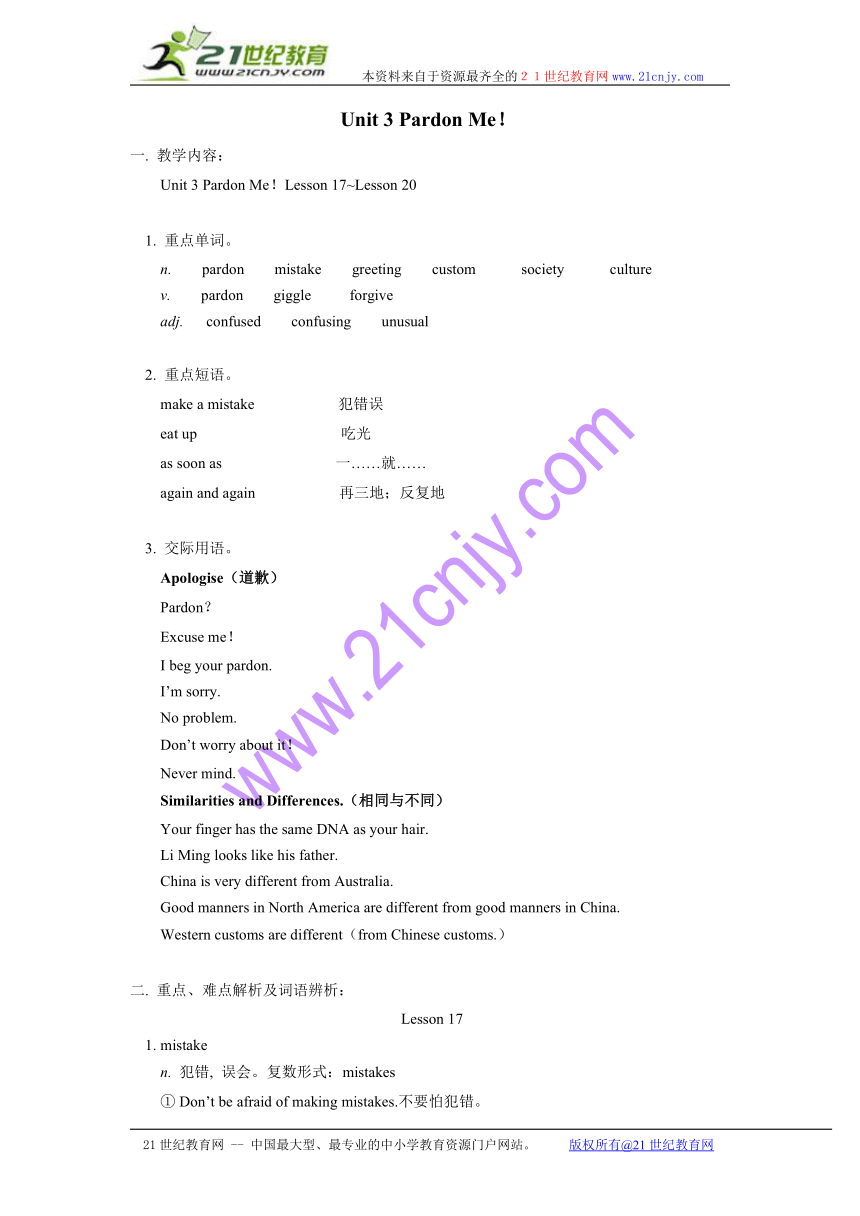
本资料来自于资源最齐全的21世纪教育网www.21cnjy.com Unit 3 Pardon Me! 一. 教学内容: Unit 3 Pardon Me!Lesson 17~Lesson 20 1. 重点单词。 n. pardon mistake greeting custom society culture v. pardon giggle forgive adj. confused confusing unusual 2. 重点短语。 make a mistake 犯错误 eat up 吃光 as soon as 一……就…… again and again 再三地;反复地 3. 交际用语。 Apologise(道歉) Pardon? Excuse me! I beg your pardon. I’m sorry. No problem. Don’t worry about it! Never mind. Similarities and Differences.(相同与不同) Your finger has the same DNA as your hair. Li Ming looks like his father. China is very different from Australia. Good manners in North America are different from good manners in China. Western customs are different(from Chinese customs.) 二. 重点、难点解析及词语辨析: Lesson 17[来源:21世纪教育网] 1. mistake n. 犯错, 误会。复数形式:mistakes ① Don’t be afraid of making mistakes.不要怕犯错。 ② He hit me by mistake. 他误打了我。 vt. 错认,误会。三单形式:mistakes; v.-ing形式:mistaking;过去式:mistook;过去分词:mistaken。 ③ I mistook the house.我认错了房子。 ④ I mistook you for an American.我误认为你是一个美国人。 2. paid 是pay的过去式 pay vt.(钱)支付,花费;vi. 付款 ①I paid ten dollars for the books. 那些书花了我十美元。 ② I have already paid off the money of the car. 我已经把车款付清了。 拓展 pay attention to + n./v-ing 注意…… ③ Pay more attention to your work. 要多注意你的工作。 pay a visit to=pay...a visit访问 ④ I paid a visit to him yesterday.我昨天访问了他。 比较:“花费”种种 sb. pay some money for sth.某人为某物付多少钱 sth. cost sb. some money某物花去某人多少钱 ⑤ This coat cost me £6.这件上衣花了我6英镑。 sth. takes sb. some time. =It takes sb. some time to do sth. 做某件事花费某人多少时间 ⑥ The job took us a week.做这件事花费了我一周的时间。 sb. spend some money/time on sth./(in)doing sth. 3. too much过多的,太多的,用在不可数名词前。 ①I drank too much beer last night. 昨天晚上我喝啤酒喝得太多了。 ②Too much was happening all at once. 同时发生的事情太多了。 拓展: much too中,much用在too前来加强语气, 后跟形容词或副词;too many后跟可数名词或集合名词。 ③ You are much too kind to me. 你对我实在太好了。 ④ There are far too many people here. 这里人实在太多了。 4. one pron. & num. 拓展: ※ one除作数词外,还可作代词,代替上文中出现的单数 名词(人或物)以避免重复。如: ①I have two bags. One is big and one is small. 我有两个包。一个大的,一个小的。 ※ one代替可数名词,表示泛指。如: ② I have a car. Do you have one? 我有一辆汽车,你有吗? ※ one如被定语修饰而仍表示泛指时,在修饰语前可以加不定冠词a或an. ③ There are two bikes behind the house, a new one and old one. 房后有两辆自行车,一辆是新的一辆是旧的。 ※ one被定语修饰表示特指时,在修饰语前可以用定冠词the。如: ④—Which man?哪个人? —The tall one. 个子高的那个人。 ※ one的复数形式是ones,用来代替复数名词,其用法同one.如: ⑤—What colour are the flowers? 花是什么颜色的? —The ones on the desk are red, and the ones on the window are yellow. 桌上 ... ...
~~ 您好,已阅读到文档的结尾了 ~~